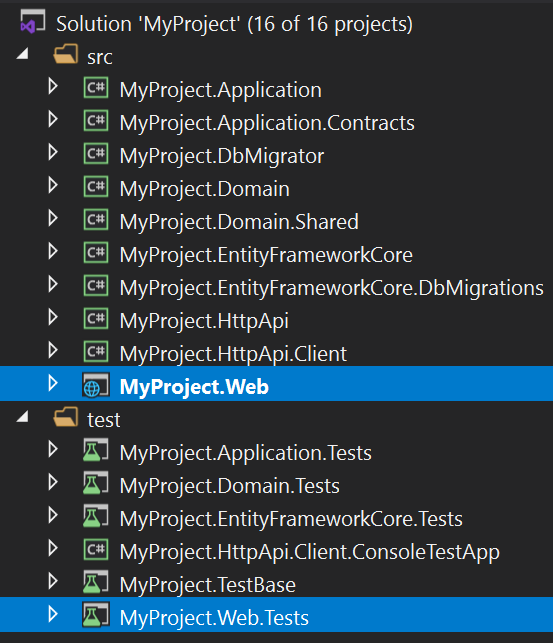ASP.NET Core MVC / Razor Pages: Testing
You can follow the ASP.NET Core Integration Tests documentation to learn details of ASP.NET Core integration tests. This document explains the additional test infrastructure provided by the ABP Framework.
The Application Startup Template
The Application Startup Template contains the .Web project that contains UI views/pages/components of the application and a .Web.Tests project to test these.
Testing the Razor Pages
Assume that you've created a Razor Page, named Issues.cshtml with the following contents;
Issues.cshtml.cs
using System.Collections.Generic;
using System.Threading.Tasks;
using Microsoft.AspNetCore.Mvc.RazorPages;
using MyProject.Issues;
namespace MyProject.Web.Pages
{
public class IssuesModel : PageModel
{
public List<IssueDto> Issues { get; set; }
private readonly IIssueAppService _issueAppService;
public IssuesModel(IIssueAppService issueAppService)
{
_issueAppService = issueAppService;
}
public async Task OnGetAsync()
{
Issues = await _issueAppService.GetListAsync();
}
}
}
Issues.cshtml
@page
@model MyProject.Web.Pages.IssuesModel
<h2>Issue List</h2>
<table id="IssueTable" class="table">
<thead>
<tr>
<th>Issue</th>
<th>Closed?</th>
</tr>
</thead>
<tbody>
@foreach (var issue in Model.Issues)
{
<tr>
<td>@issue.Title</td>
<td>
@if (issue.IsClosed)
{
<span>Closed</span>
}
else
{
<span>Open</span>
}
</td>
</tr>
}
</tbody>
</table>
This page simply creates a table with the issues:
You can write a test class inside the .Web.Tests project just like the example below:
using System.Threading.Tasks;
using HtmlAgilityPack;
using Shouldly;
using Xunit;
namespace MyProject.Pages
{
public class Issues_Tests : MyProjectWebTestBase
{
[Fact]
public async Task Should_Get_Table_Of_Issues()
{
// Act
var response = await GetResponseAsStringAsync("/Issues");
//Assert
var htmlDocument = new HtmlDocument();
htmlDocument.LoadHtml(response);
var tableElement = htmlDocument.GetElementbyId("IssueTable");
tableElement.ShouldNotBeNull();
var trNodes = tableElement.SelectNodes("//tbody/tr");
trNodes.Count.ShouldBeGreaterThan(0);
}
}
}
GetResponseAsStringAsync is a shortcut method that comes from the base class that performs a HTTP GET request, checks if the resulting HTTP Status is 200 and returns the response as a string.
You can use the base
Clientobject (of typeHttpClient) to perform any kind of request to the server and read the response yourself.GetResponseAsStringAsyncis just a shortcut method.
This example uses the HtmlAgilityPack library to parse the incoming HTML and test if it contains the issue table.
This example assumes there are some initial issues in the database. See the The Data Seed section of the Testing document to learn how to seed test data, so your tests can assume some initial data available in the database.
Testing the Controllers
Testing a controller is not different. Just perform a request to the server with a proper URL, get the response and make your assertions.
View Result
If the controller returns a View, you can use a similar code to test the returned HTML. See the Razor Pages example above.
Object Result
If the controller returns an object result, you can use the GetResponseAsObjectAsync base method.
Assume that you've a controller as defined below:
using System.Collections.Generic;
using System.Threading.Tasks;
using Microsoft.AspNetCore.Mvc;
using MyProject.Issues;
using Volo.Abp.AspNetCore.Mvc;
namespace MyProject.Web.Controllers
{
[Route("api/issues")]
public class IssueController : AbpController
{
private readonly IIssueAppService _issueAppService;
public IssueController(IIssueAppService issueAppService)
{
_issueAppService = issueAppService;
}
[HttpGet]
public async Task<List<IssueDto>> GetAsync()
{
return await _issueAppService.GetListAsync();
}
}
}
You can write a test code to execute the API and get the result:
using System.Collections.Generic;
using System.Threading.Tasks;
using MyProject.Issues;
using Shouldly;
using Xunit;
namespace MyProject.Pages
{
public class Issues_Tests : MyProjectWebTestBase
{
[Fact]
public async Task Should_Get_Issues_From_Api()
{
var issues = await GetResponseAsObjectAsync<List<IssueDto>>("/api/issues");
issues.ShouldNotBeNull();
issues.Count.ShouldBeGreaterThan(0);
}
}
}
Testing the JavaScript Code
ABP Framework doesn't provide any infrastructure to test your JavaScript code. You can use any test framework and tooling to test your JavaScript code.
The Test Infrastructure
Volo.Abp.AspNetCore.TestBase package provides the test infrastructure that is integrated to the ABP Framework and ASP.NET Core.
Volo.Abp.AspNetCore.TestBase package is already installed in the
.Web.Testsproject.
This package provides the AbpAspNetCoreIntegratedTestBase as the fundamental base class to derive the test classes from. The MyProjectWebTestBase base class used above inherits from the AbpAspNetCoreIntegratedTestBase, so we indirectly inherited the AbpAspNetCoreIntegratedTestBase.
Base Properties
The AbpAspNetCoreIntegratedTestBase provides the following base properties those are used in the tests:
Server: ATestServerinstance that hosts the web application in tests.Client: AnHttpClientinstance that is configured to perform requests to the test server.ServiceProvider: The service provider that you can resolve services in case of need.
Base Methods
AbpAspNetCoreIntegratedTestBase provides the following methods that you can override if you need to customize the test server:
ConfigureServicescan be overridden to register/replace services only for the derived test class.CreateHostBuildercan be used to customize building theIHostBuilder.
See Also


